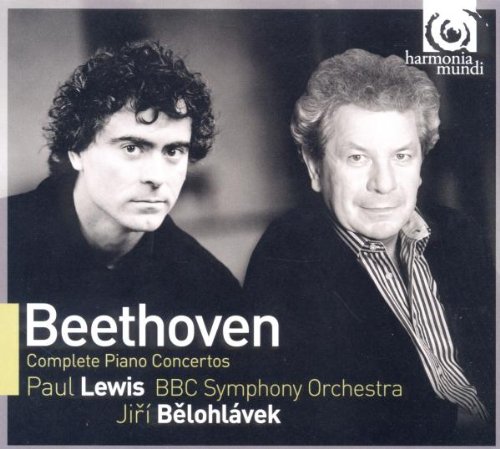Beethoven Complete Piano Concertos
The unassuming musicianship of Paul Lewis shines through in Beethoven
View record and artist detailsRecord and Artist Details
Composer or Director: Ludwig van Beethoven
Genre:
Orchestral
Label: Harmonia Mundi
Magazine Review Date: 9/2010
Media Format: CD or Download
Media Runtime: 68
Mastering:
Stereo
DDD
Catalogue Number: HMC902053/5

Tracks:
| Composition | Artist Credit |
|---|---|
| Concerto for Piano and Orchestra No. 1 |
Ludwig van Beethoven, Composer
BBC Symphony Orchestra Jirí Belohlávek, Conductor Ludwig van Beethoven, Composer Paul Lewis, Piano |
| Concerto for Piano and Orchestra No. 2 |
Ludwig van Beethoven, Composer
BBC Symphony Orchestra Jirí Belohlávek, Conductor Ludwig van Beethoven, Composer Paul Lewis, Piano |
| Concerto for Piano and Orchestra No. 3 |
Ludwig van Beethoven, Composer
BBC Symphony Orchestra Jirí Belohlávek, Conductor Ludwig van Beethoven, Composer Paul Lewis, Piano |
| Concerto for Piano and Orchestra No. 4 |
Ludwig van Beethoven, Composer
BBC Symphony Orchestra Jirí Belohlávek, Conductor Ludwig van Beethoven, Composer Paul Lewis, Piano |
| Concerto for Piano and Orchestra No. 5, 'Emperor' |
Ludwig van Beethoven, Composer
BBC Symphony Orchestra Jirí Belohlávek, Conductor Ludwig van Beethoven, Composer Paul Lewis, Piano |
Author: Bryce Morrison
With this three-disc album of Beethoven’s piano concertos Paul Lewis complements his earlier set of the 32 sonatas and also his appearances at the Proms this summer where for the first time all five concertos will be played by a single artist. So may I say at once that Harmonia Mundi’s eagerly awaited set is a superlative achievement and that Lewis’s partnership with Jirí Belohlávek is an ideal match of musical feeling, vigour and refinement.
True, for aficionados of eccentricity – even of brilliant eccentricity – from the likes of Gould, Pletnev and Mustonen, Lewis may at times seem overly restrained but the rewards of such civilised, musically responsible and vital playing seem to me infinite. Above all there is no sense of an artist looking over his shoulder to see what other pianists have come up with. Throughout the cycle Lewis is enviably and naturally true to his own distinctive lights, his unassuming but shining musicianship always paramount. His stylistic consistency can make the singling-out of this or that detail irrelevant, yet how could I fail to mention Lewis’s and Belohlávek’s true sense of the Allegro con brio in the First Concerto, in music-making that is vital but never driven? Less rugged than, say, Serkin, such playing is no less personal and committed. In the central Largo Lewis achieves a quiet, hauntingly sustained poise and eloquence, while in the finale his crisp articulation sends Beethoven’s early ebullience dancing into captivating life.
The same virtues characterise the Second Concerto; but when it comes to the Third, Lewis and Belohlávek (and one is always aware of a true partnership) hit a more controversial note. The first movement is less con brio than from most, as if to emphasise Beethoven’s step towards a darker region of the imagination (what EM Forster memorably called “Beethoven’s C minor of life”), while the finale is thought-provoking in its restraint. Yet once again Lewis’s comprehensive mastery is devoid of all overt display, and in the Fourth Concerto his playing achieves a rare nimbleness, affection and transparency. And if there are those who, again, wish for a higher degree of drama and assertion, others will recognise an artist who, in Charles Rosen’s words, achieves so much while appearing to do so little (pianists such as Lipatti, Solomon and Clara Haskil come to mind). At the same time the Fourth Concerto contains some delightful surprises. Lewis’s ad libitum flourish at 6'12" in the finale provides an exuberant touch, as do his deft and witty arpeggiations of the chords just before the concerto’s homecoming. Here in particular is an engaging and playful rejoinder to the Andante con moto’s introspection, the entire performance delectably animated and light-fingered. Nor is there a hint of strain or strenuous characterisation in the Fifth Concerto. Lewis’s first entry in the Adagio has a slight catch in the voice, as it were, to register the music’s sublimity, and his overall approach is devoid of the tub-thumping rhetoric familiar from too many Emperors.
And so, all in all, these records take their place among the finest Beethoven piano concerto performances so that even when you recall beloved issues by Wilhelm Kempff, Emil Gilels, Radu Lupu and Murray Perahia (to name but four), Lewis ensures that you return refreshed and with a renewed sense of Beethoven’s range and beauty. Personally I would never want to be without any of those previous discs, nor without Argerich’s never-to-be-completed recordings (sadly she considers the Fourth Concerto outside her scope; can her friends and musical partners Nelson Freire and Stephen Kovacevich persuade her otherwise?). Balance and sound are natural and exemplary, leaving us to look forward to Lewis’s forthcoming CD of the Diabelli Variations, for Brendel the greatest of all keyboard works. This is a cycle to live with and revisit.
Discover the world's largest classical music catalogue with Presto Music.

Gramophone Digital Club
- Digital Edition
- Digital Archive
- Reviews Database
- Full website access
From £8.75 / month
Subscribe
Gramophone Full Club
- Print Edition
- Digital Edition
- Digital Archive
- Reviews Database
- Full website access
From £11.00 / month
Subscribe
If you are a library, university or other organisation that would be interested in an institutional subscription to Gramophone please click here for further information.




